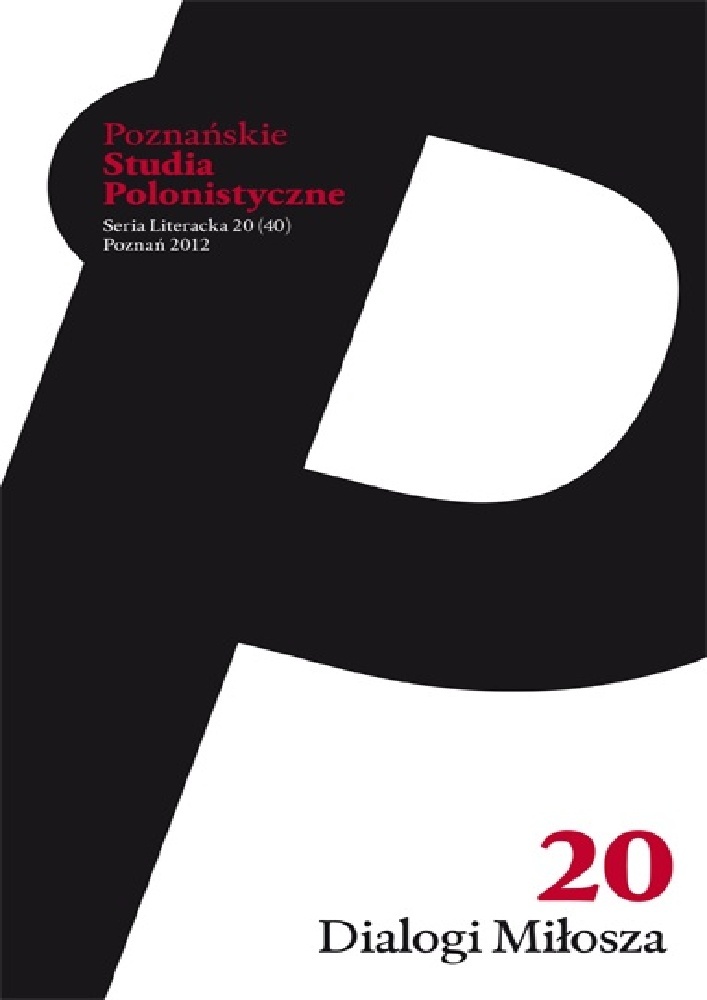Abstract
The article is thematically related to the fundamental essay by the French hermeneutic philosopher, On Oneself as Another, which discussed with reference to Miłosz’s later writings (poetry and essays). The autobiographical quality of Miłosz’s expression is discussed through the concept of “otherness” as presented by Ricoeur. The discussion is conducted in the framework of triple relation of a subjective “I”: to one’s body, to the Other, and to one’s conscience. Miłosz, in his later works, responds to the ailings of the body with understanding, or even a sort of tenderness. Similar emotions are evoked by his contact with the Other, embodied by his ancestors and contemporaries. The responsibility for another person, however, and the communion with fellow people, are related, in his work, with the category of conscience. An attempt to narrate “oneself as another” allowed the Polish poet to reduce the seemingly irremovable rift between an artist and “the human family”; that rift was for Miłosz a troublesome legacy of modernism.References
Błoński J., Miłosz jak świat, Kraków 1998.
Burek T., Autobiografia jako rozpamiętywanie losu. Nie tylko o „Rodzinnej Europie”, w: Poznawanie Miłosza 2. Część druga 1980–1998, red. A. Fiut, Kraków 2001.
Davies M., Empatia. O umiejętności współodczuwania, przeł. J. Kubiak, Gdańsk 1999.
Fiut A., Moment wieczny. Poezje Czesława Miłosza, Kraków 1998.
Franaszek A., Miłosz. Biografia, Kraków 2011.
Geertz C., Zastane światło. Antropologiczne refleksje na tematy filozoficzne, przeł., wstęp Z. Pucek, Kraków 2003.
Kaźmierczyk Z., Dzieło demiurga. Zapis gnostyckiego doświadczenia egzystencji we wczesnej poezji Czesława Miłosza, Gdańsk 2011.
Kopaliński W., Tejrezjasz [hasło], w: Słownik mitów i tradycji kultury, Warszawa 1997.
Legeżyńska A., Gest pożegnania. Elegijność ironiczna w poezji końca wieku, w: Gest pożegnania. Szkice o poetyckiej świadomości elegijno-ironicznej, Poznań 1999.
Lejeune Ph., Wariacje na temat pewnego paktu. O autobiografii, red. R. Lubas-Bartoszyńska, przeł. W. Grajewski, S. Jaworski, A. Labuda, R. Lubas-Bartoszyńska, Kraków 2001.
Łebkowska A., Empatia. O literackich narracjach przełomu XX i XI wieku, Kraków 2008.
Medycyna to sztuka rozmowy, „Gazeta Wyborcza”, 21 października 2011.
Miłosz C. , Haiku, Kraków 1992.
Miłosz C., Piesek przydrożny, Kraków 1997.
Miłosz C., Rodzinna Europa, Kraków 1994.
Miłosz C., Świadectwo poezji. Sześć wykładów o dotkliwościach naszego wieku, Warszawa 1990.
Miłosz C., Wiersze wszystkie, Kraków 2011.
Miłosz C., Zaczynając od moich ulic, Wrocław 1990.
Miłosz C., Ziemia Ulro, Warszawa 1982.
Nycz R., Literatura jako trop rzeczywistości. Poetyka epifanii w nowoczesnej literaturze polskiej, Kraków 2001.
Ricoeur P., Miłość i sprawiedliwość, przeł. M. Drwęga, przedmowa J.L. Schlegel, Kraków 2010.
Ricoeur P., O sobie samym jako innym, przeł. B. Chełstowski, oprac., wstęp M. Kowalska, Warszawa 2003.
Ricoeur P., Pamięć, historia, zapomnienie, przeł. J. Margański, Kraków 2006.
Ricoeur P., Żyć aż do śmierci oraz fragmenty, przeł. A. Turczyn, Kraków 2008.
Rosner K., Narracja, tożsamość i czas, Kraków 2003.
Rydz A., Mnemozyna. O pamięci autobiograficznej w poezji polskiej, Poznań 2011.
License
Authors
Authors of texts accepted for publication in „Poznańskie Studia Polonistyczne. Seria Literacka” are required to complete, sign and return to the editor's office the Agreement for granting a royalty-free license to works with a commitment to grant a CC sub-license.
Under the agreement, the authors of texts published in „Poznańskie Studia Polonistyczne. Seria Literacka” grant the Adam Mickiewicz University in Poznań a non-exclusive, royalty-free license and authorize the use of Attribution-NoDerivatives 4.0 International (CC BY-ND 4.0)Creative Commons sub-license.
The authors retain the right to continue the free disposal of the work.
Users
Interested Internet users are entitled to use works published in „Poznańskie Studia Polonistyczne. Seria Literacka” since 2016, for non-commercial purposes only, under the following conditions:
- attribution - obligation to provide, together with the distributed work, information about the authorship, title, source (link to the original work, DOI) and the license itself.
- no derivatives - the work must be preserved in its original form, without the author's consent it is not possible to distribute the modified work, such as translations, publications, etc.
Copyrights are reserved for all texts published before 2016.
Miscellaneous
Adam Mickiewicz University in Poznań retains the right to magazines as a whole (layout, graphic form, title, cover design, logo etc.).
